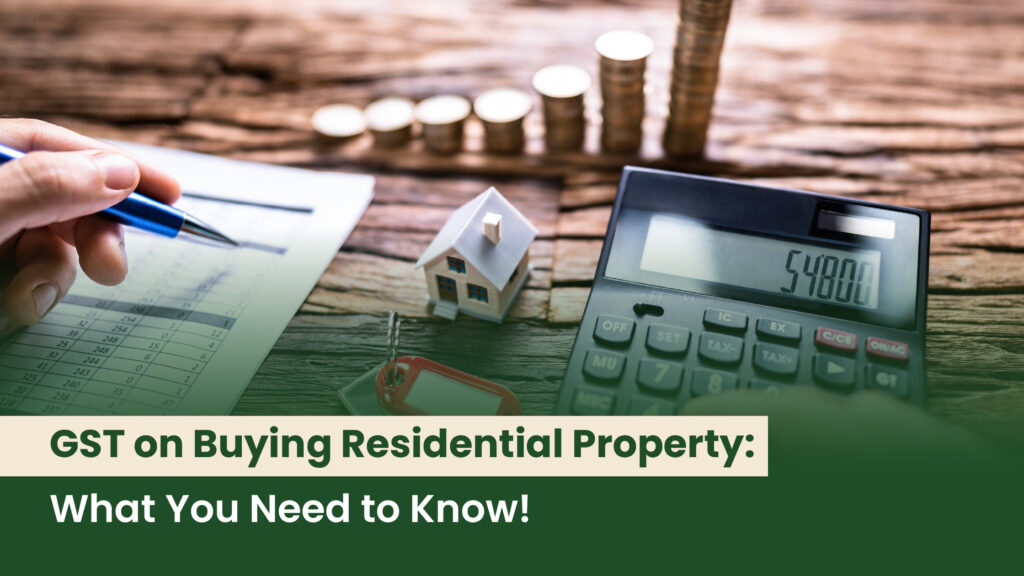
Buying a home is one of the most important and expensive choices a person can make. Along with evaluating the location, builder reputation, and amenities, understanding the tax implications is equally crucial. In India, the GST on residential property is a significant aspect that affects the final price of your home. Whether you’re buying a flat or a piece of land, understanding how GST on residential property applies can help you make better decisions.
What is GST and How Does It Affect Property Buying?
Goods and Services Tax (GST) is a unified tax introduced in 2017 to replace multiple indirect taxes. In real estate, GST is charged on properties that are still under construction, but not on homes that are finished and ready to move into..
So, if you’re planning to buy a house that’s still being built, you’ll have to pay GST on it. But if you are buying land or a fully constructed property with an Occupancy Certificate (OC), GST does not apply.
GST on Residential Property: Current Rates
As of the latest guidelines, here’s how the GST on residential property is applied:
For affordable housing, GST is charged at 1% (without any tax credit benefits).
For non-affordable housing, the GST rate is 5% (also without tax credit benefits).
Affordable housing is defined as:
A house with a carpet area of up to 60 square meters in metro cities and 90 square meters in non-metro cities.
The value should not exceed ₹45 lakhs.
For luxury or non-affordable homes, the GST rate is 5%. This only applies if you’re buying a property that is still under construction.
Buying Land vs Buying an Under-Construction Property
A common question among buyers is whether GST on residential property applies when buying land. The answer is no.
Buying land is exempt from GST. When you purchase a plot or a piece of land, either for investment or to build your own home, GST is not charged. However, registration for new plot is still mandatory, and you will have to pay stamp duty and registration charges, which vary from state to state.
But when the sale involves land and construction together — like in the case of builder-developed plots or villa projects — GST may apply to the construction portion, even though the land itself is exempt.
Other Costs Involved in Registration for New Plot or Property
Even though GST on residential property is not applicable in all cases, there are other charges you should be aware of:
Stamp Duty: This is a state-level tax, usually between 5% to 7% of the property value.
Registration Charges: Typically around 1% of the sale value.
Legal and Documentation Fees: Charges may vary depending on services like sale deed preparation, mutation, and title verification.
So, while GST might not always apply, registration for new plot or home will still involve significant costs that you should budget for.
GST Input Tax Credit (ITC): What Changed?
Before April 2019, builders could claim Input Tax Credit (ITC) on materials like cement, steel, etc., and pass on the benefits to buyers. However, in the revised GST regime, builders cannot claim ITC for new residential projects under the 1% and 5% rates.
This change was made to simplify taxation and reduce discrepancies. However, the removal of ITC may have led some builders to indirectly pass the increased cost to the buyers, making the overall pricing slightly higher.
What are the things to consider before buying residential property?
Before signing on the dotted line, make sure you keep the following in mind:
- Construction Status
Make sure to find out if the property is still being built or if it’s ready to move into. This will determine if GST on residential property applies.
- Project Type
If the project includes buying land and construction together, clarify how much GST will be levied on the construction portion.
- Builder Credentials
Choose a builder who offers transparent billing and clearly states the GST tax on property, so there are no surprises later.
- Legal Checks
Ensure all documents are in place — including land titles, approvals, and the Occupancy Certificate. For registration for new plot, ensure the land is free from litigation.
- Price Breakdown
Ask for a detailed cost sheet. This should include base cost, GST, stamp duty, registration fees, and any other charges.
What are the common misconceptions related to GST?
“GST applies to all property purchases.”
That’s not true. GST applies only to properties that are still under construction, not to homes that are ready to move into or to plots of land.
“If I am buying land and building later, I will pay GST.”
Partly true. GST doesn’t apply when buying land, but if you hire a builder to construct your home, GST will apply to the construction cost.
“There is no need for registration if I’m just buying land.”
False. Registration for the new plot is legally mandatory and ensures legal ownership.
Important Takeaway
Knowing how GST works on residential property is important for making a wise and informed choice. If you’re buying land, remember that GST doesn’t apply, but other charges like stamp duty and registration for new plots will still be part of your expenses.
For properties still being built, the GST you pay will depend on the price and type of home. Be sure to get a detailed cost breakdown and talk to a legal or financial expert before making a decision. With proper knowledge, you can avoid surprises and enjoy peace of mind in your home-buying journey.
